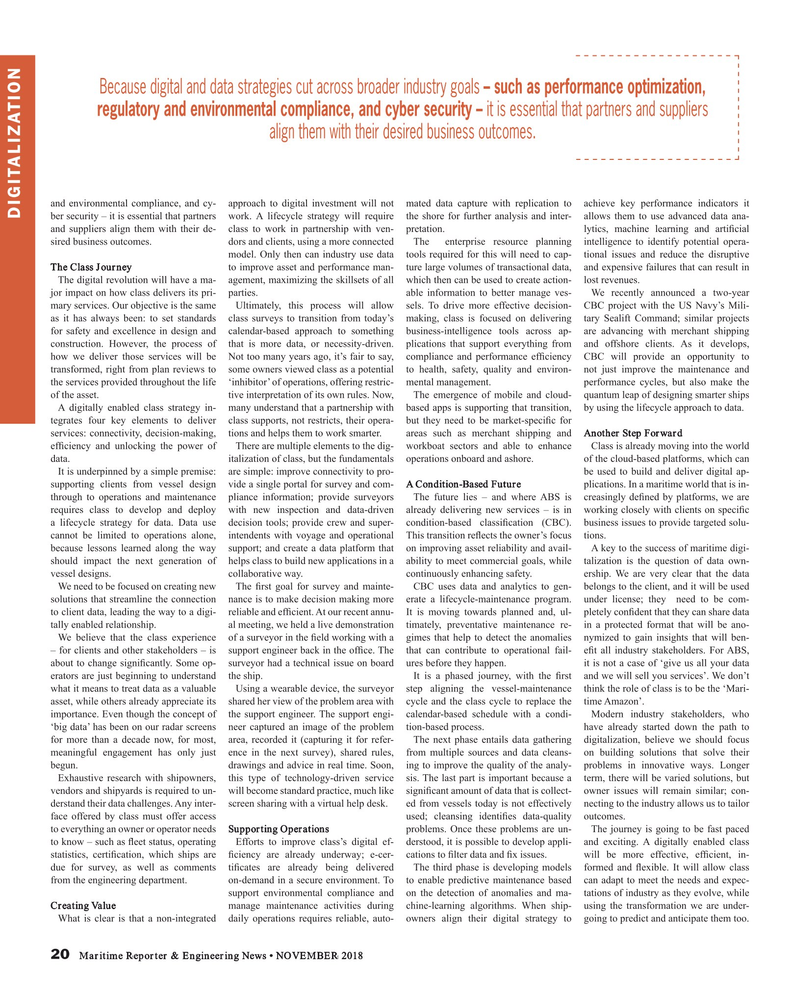
Page 20: of Maritime Reporter Magazine (November 2018)
Workboat Edition
Read this page in Pdf, Flash or Html5 edition of November 2018 Maritime Reporter Magazine
Because digital and data strategies cut across broader industry goals – such as performance optimization, regulatory and environmental compliance, and cyber security – it is essential that partners and suppliers align them with their desired business outcomes.
and environmental compliance, and cy- approach to digital investment will not mated data capture with replication to achieve key performance indicators it
DIGITALIZATION ber security – it is essential that partners work. A lifecycle strategy will require the shore for further analysis and inter- allows them to use advanced data ana- and suppliers align them with their de- class to work in partnership with ven- pretation. lytics, machine learning and arti? cial sired business outcomes. dors and clients, using a more connected The enterprise resource planning intelligence to identify potential opera- model. Only then can industry use data tools required for this will need to cap- tional issues and reduce the disruptive
The Class Journey to improve asset and performance man- ture large volumes of transactional data, and expensive failures that can result in
The digital revolution will have a ma- agement, maximizing the skillsets of all which then can be used to create action- lost revenues.
jor impact on how class delivers its pri- parties. able information to better manage ves- We recently announced a two-year mary services. Our objective is the same Ultimately, this process will allow sels. To drive more effective decision- CBC project with the US Navy’s Mili- as it has always been: to set standards class surveys to transition from today’s making, class is focused on delivering tary Sealift Command; similar projects for safety and excellence in design and calendar-based approach to something business-intelligence tools across ap- are advancing with merchant shipping construction. However, the process of that is more data, or necessity-driven. plications that support everything from and offshore clients. As it develops, how we deliver those services will be Not too many years ago, it’s fair to say, compliance and performance ef? ciency CBC will provide an opportunity to transformed, right from plan reviews to some owners viewed class as a potential to health, safety, quality and environ- not just improve the maintenance and the services provided throughout the life ‘inhibitor’ of operations, offering restric- mental management. performance cycles, but also make the of the asset. tive interpretation of its own rules. Now, The emergence of mobile and cloud- quantum leap of designing smarter ships
A digitally enabled class strategy in- many understand that a partnership with based apps is supporting that transition, by using the lifecycle approach to data.
tegrates four key elements to deliver class supports, not restricts, their opera- but they need to be market-speci? c for services: connectivity, decision-making, tions and helps them to work smarter. areas such as merchant shipping and Another Step Forward ef? ciency and unlocking the power of There are multiple elements to the dig- workboat sectors and able to enhance Class is already moving into the world data. italization of class, but the fundamentals operations onboard and ashore. of the cloud-based platforms, which can
It is underpinned by a simple premise: are simple: improve connectivity to pro- be used to build and deliver digital ap- supporting clients from vessel design vide a single portal for survey and com- A Condition-Based Future plications. In a maritime world that is in- through to operations and maintenance pliance information; provide surveyors The future lies – and where ABS is creasingly de? ned by platforms, we are requires class to develop and deploy with new inspection and data-driven already delivering new services – is in working closely with clients on speci? c a lifecycle strategy for data. Data use decision tools; provide crew and super- condition-based classi? cation (CBC). business issues to provide targeted solu- cannot be limited to operations alone, intendents with voyage and operational This transition re? ects the owner’s focus tions.
because lessons learned along the way support; and create a data platform that on improving asset reliability and avail- A key to the success of maritime digi- should impact the next generation of helps class to build new applications in a ability to meet commercial goals, while talization is the question of data own- vessel designs. collaborative way. continuously enhancing safety. ership. We are very clear that the data
We need to be focused on creating new The ? rst goal for survey and mainte- CBC uses data and analytics to gen- belongs to the client, and it will be used solutions that streamline the connection nance is to make decision making more erate a lifecycle-maintenance program. under license; they need to be com- to client data, leading the way to a digi- reliable and ef? cient. At our recent annu- It is moving towards planned and, ul- pletely con? dent that they can share data tally enabled relationship. al meeting, we held a live demonstration timately, preventative maintenance re- in a protected format that will be ano-
We believe that the class experience of a surveyor in the ? eld working with a gimes that help to detect the anomalies nymized to gain insights that will ben- – for clients and other stakeholders – is support engineer back in the of? ce. The that can contribute to operational fail- e? t all industry stakeholders. For ABS, about to change signi? cantly. Some op- surveyor had a technical issue on board ures before they happen. it is not a case of ‘give us all your data erators are just beginning to understand the ship. It is a phased journey, with the ? rst and we will sell you services’. We don’t what it means to treat data as a valuable Using a wearable device, the surveyor step aligning the vessel-maintenance think the role of class is to be the ‘Mari- asset, while others already appreciate its shared her view of the problem area with cycle and the class cycle to replace the time Amazon’. importance. Even though the concept of the support engineer. The support engi- calendar-based schedule with a condi- Modern industry stakeholders, who ‘big data’ has been on our radar screens neer captured an image of the problem tion-based process. have already started down the path to for more than a decade now, for most, area, recorded it (capturing it for refer- The next phase entails data gathering digitalization, believe we should focus meaningful engagement has only just ence in the next survey), shared rules, from multiple sources and data cleans- on building solutions that solve their begun. drawings and advice in real time. Soon, ing to improve the quality of the analy- problems in innovative ways. Longer
Exhaustive research with shipowners, this type of technology-driven service sis. The last part is important because a term, there will be varied solutions, but vendors and shipyards is required to un- will become standard practice, much like signi? cant amount of data that is collect- owner issues will remain similar; con- derstand their data challenges. Any inter- screen sharing with a virtual help desk. ed from vessels today is not effectively necting to the industry allows us to tailor face offered by class must offer access used; cleansing identi? es data-quality outcomes. to everything an owner or operator needs Supporting Operations problems. Once these problems are un- The journey is going to be fast paced to know – such as ? eet status, operating Efforts to improve class’s digital ef- derstood, it is possible to develop appli- and exciting. A digitally enabled class statistics, certi? cation, which ships are ? ciency are already underway; e-cer- cations to ? lter data and ? x issues. will be more effective, ef? cient, in- due for survey, as well as comments ti? cates are already being delivered The third phase is developing models formed and ? exible. It will allow class from the engineering department. on-demand in a secure environment. To to enable predictive maintenance based can adapt to meet the needs and expec- support environmental compliance and on the detection of anomalies and ma- tations of industry as they evolve, while
Creating Value manage maintenance activities during chine-learning algorithms. When ship- using the transformation we are under-
What is clear is that a non-integrated daily operations requires reliable, auto- owners align their digital strategy to going to predict and anticipate them too. 20 Maritime Reporter & Engineering News • NOVEMBER 2018
MR #11 (18-25).indd 20 MR #11 (18-25).indd 20 10/30/2018 10:23:19 AM10/30/2018 10:23:19 AM

 19
19

 21
21
